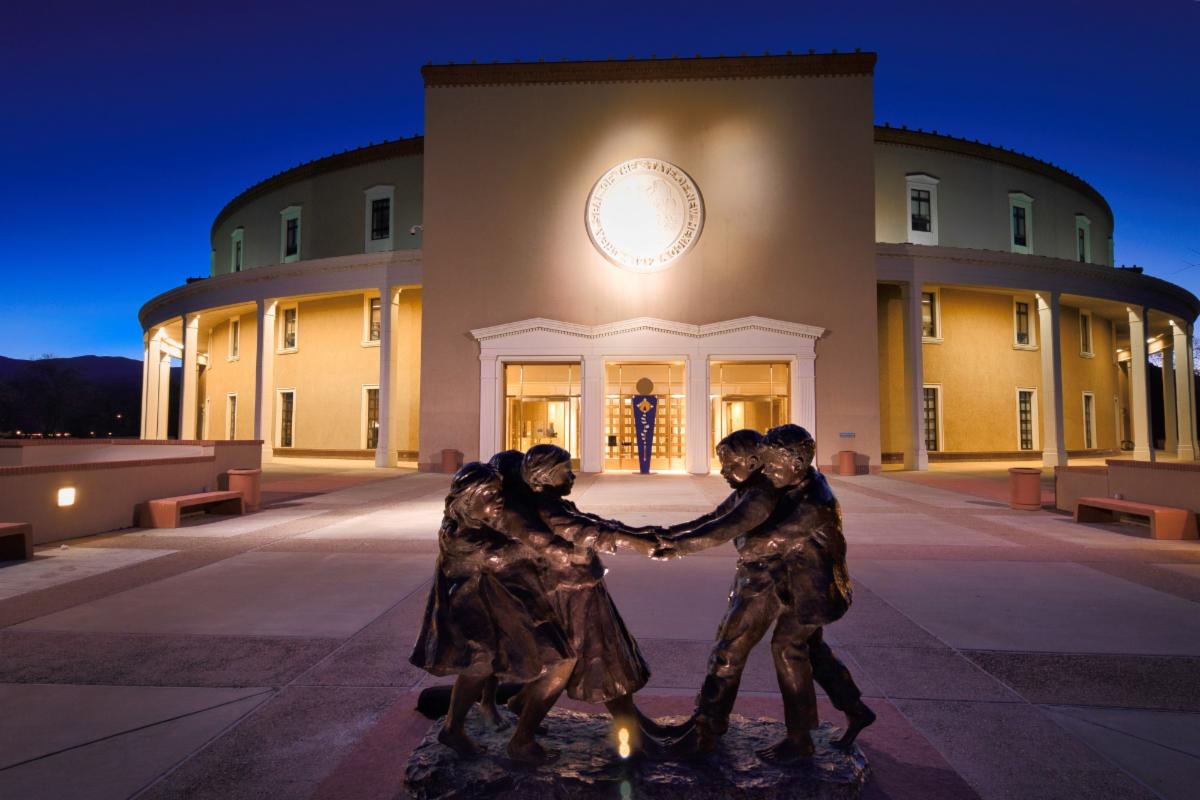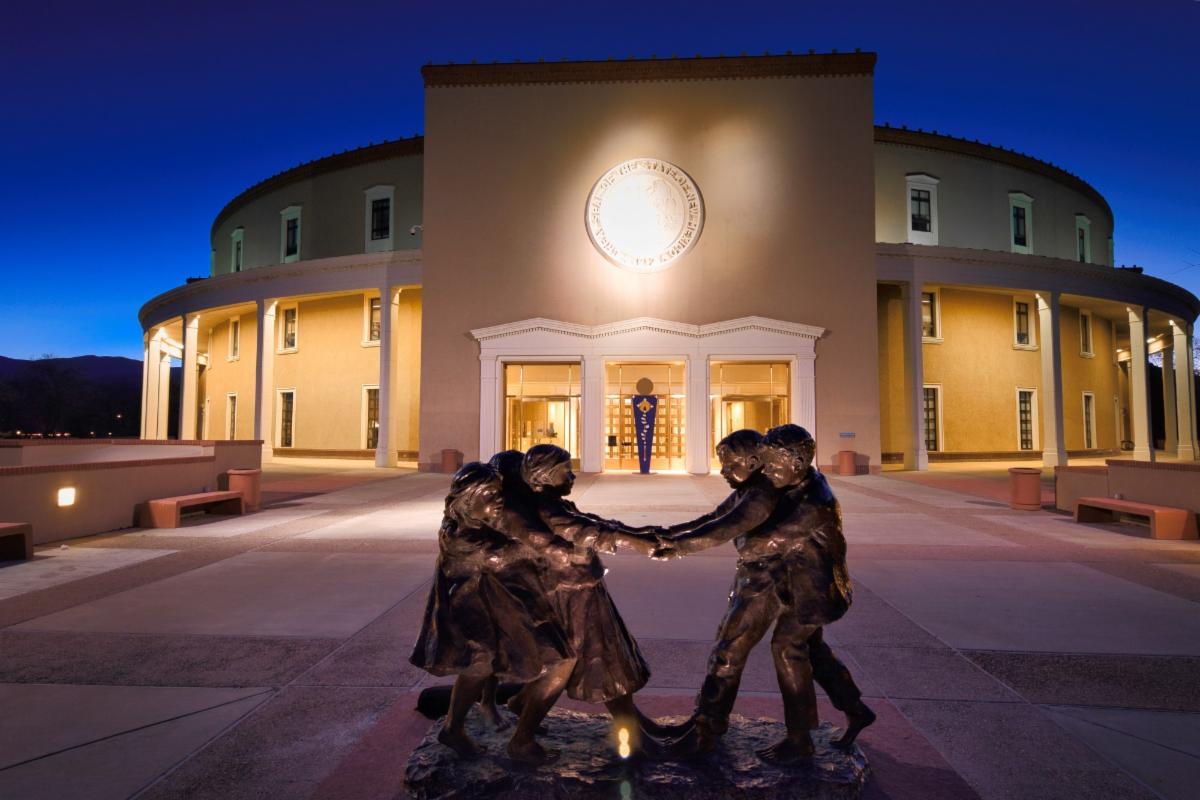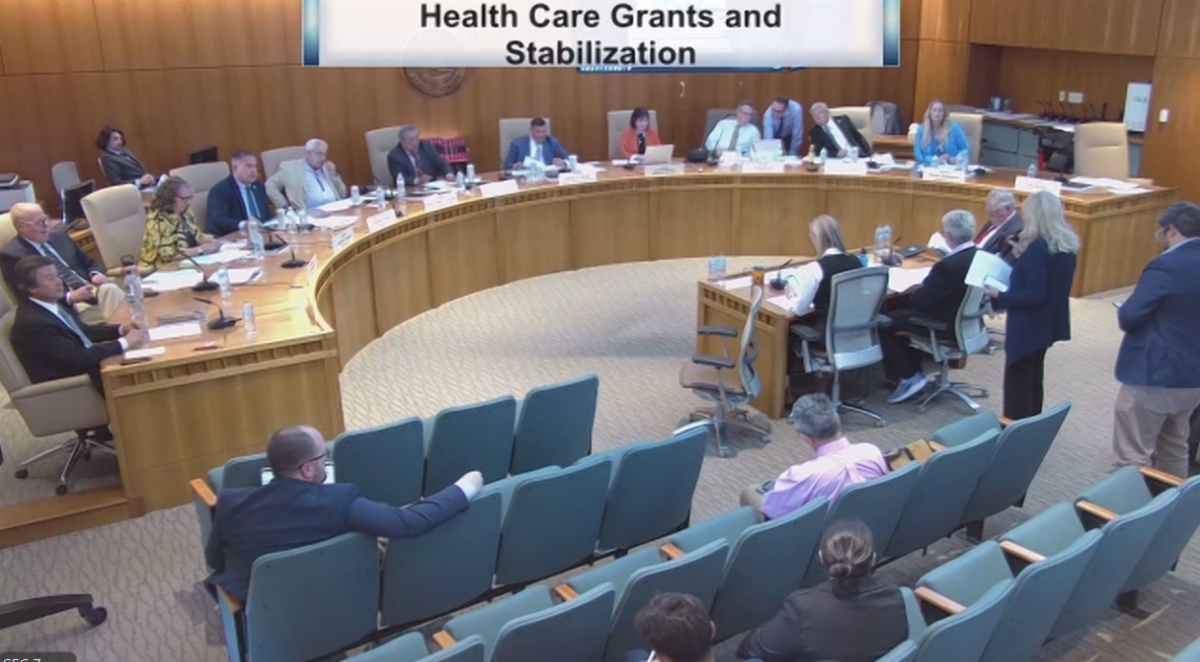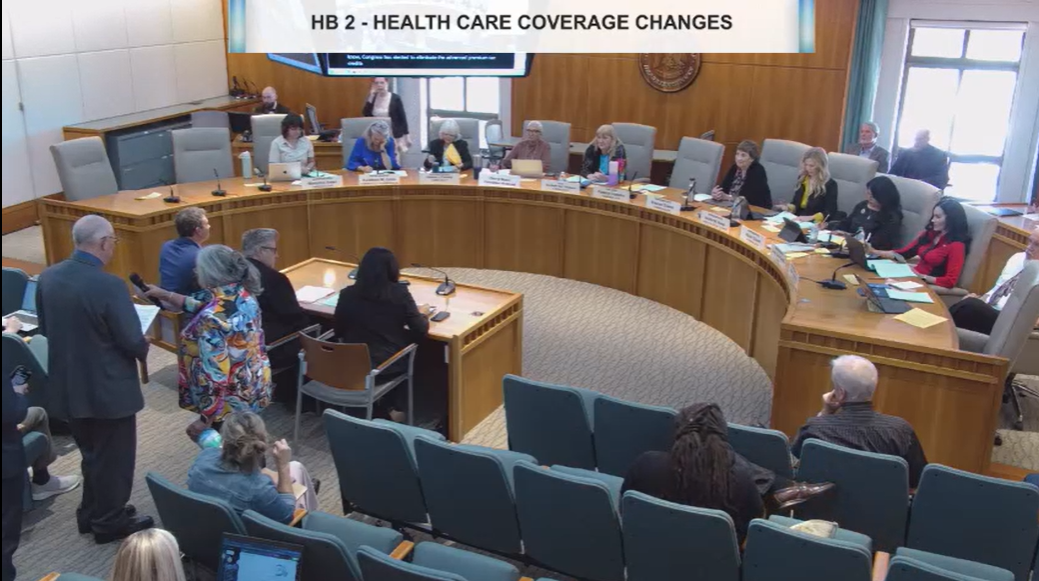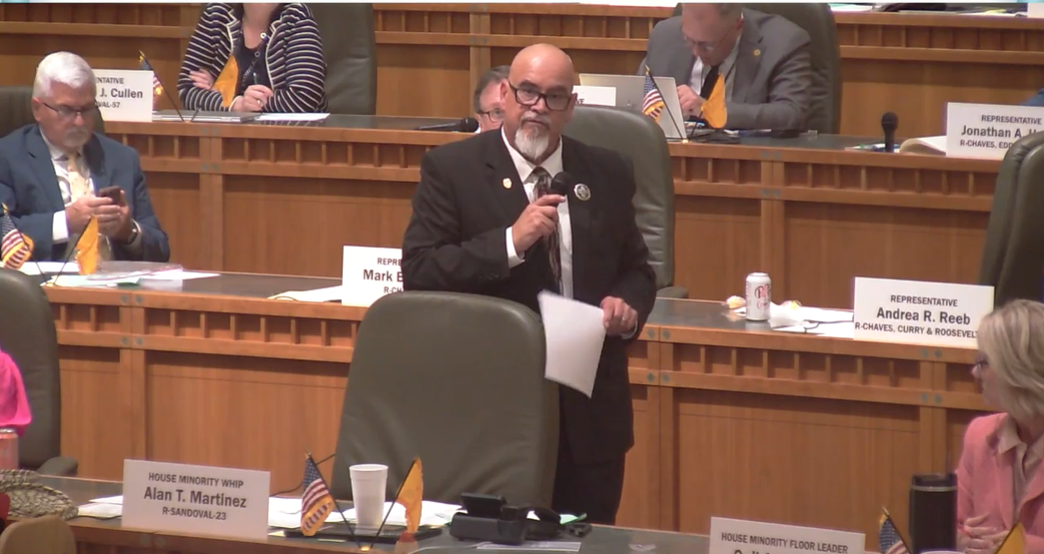FIRST SPECIAL SESSION, 2025 OF THE 57TH LEGISLATURE UNDERWAY |
|
| The special session hit the ground running today with legislators skipping the usual ceremonial formalities in favor of immediate action.
Both the Senate and House wasted no time jumping into business as members got down to work. Before the Capitol corridors had time to buzz with speculation, bills were already being introduced, and committees were convening their first meetings. The fast start of the session signals the Legislature’s intent to move swiftly through the agenda set by the governor in her proclamation. |
|
|
BUT FIRST, A RARE MOMENT OF UNITY: NEW MEXICO LEGISLATURE STANDS TOGETHER AGAINST POLITICAL VIOLENCE |
Before the work of the Legislature began, lawmakers from across the aisle in the Senate and House set aside differences to speak with one voice against political violence. The moment was prompted by the recent tragic events of the killings of political activist Charlie Kirk and U.S. Congresswoman Melissa Hortman. The message was clear and unequivocal: Violence has no place in our democracy, regardless of political affiliation. It was, in its own quiet way, a unique time for unity — and democracy at its best. |
|
|
GOVERNOR’S PROCLAMATION |
Gov. Michelle Lujan Grisham’s proclamation arrived fashionably late — dropping yesterday just hours before today’s gaveling in of the special session. While 11th-hour proclamations aren’t exactly breaking news in the Capitol, this one came with a few surprises tucked inside. The governor added several more items to the agenda than political insiders had anticipated, broadening the scope of what lawmakers will tackle in the coming days. Here’s a list of the agenda items added to the call: ⬧︎ Confirming regents for Western New Mexico University. ⬧︎ Amending mental competency laws to let metropolitan courts determine competency in criminal cases. ⬧︎ Appropriating funds for a competency pilot program and behavioral health support in legal proceedings. ⬧︎ Transferring money into a contingency fund for emergency response. ⬧︎ Appropriating funds for the Regulation and Licensing Department’s budget. Other topics the Legislature will cover included: appropriating grant money to rural hospitals, adjusting Affordable Care Act (ACA) eligibility standards and loss of Premium Tax Credits, providing Medicaid support, funding for food assistance, authorizing the New Mexico Department of Health to deliver vaccines and appropriating funds for public broadcasting. |
|
|
WHY IS NEW MEXICO HIT HARD BY FEDERAL REDUCTIONS TO MEDICAID? |
|
| Medicaid support is an important part of the appropriations bill.
Here is some background on why New Mexico is hit hard by reductions: The basic answer is that New Mexico has a high poverty rate and a significant rural population, which has resulted in New Mexico having the highest per capita enrollment in the nation. Since 2014, New Mexico has participated in the Medicaid Expansion program, which enhanced benefits to eligible low-income residents. The federal government reimburses 90% of the costs of this program and, overall, the federal government reimburses 72% of all Medicaid costs. As one can see, even small reductions in federal contributions to Medicaid can result in the loss of tens of millions of dollars to the state.
Rural Hospitals Rural hospitals are most adversely affected by any reductions since they are highly dependent on Medicaid reimbursements to stay afloat financially. It’s estimated currently that as many as 15 of 28 rural hospitals in the state could be forced to close absent funding relief from the state government. This is why the Chamber supports increased funding in order to ensure reasonable access to health care and to avoid increases to uncompensated care, (i.e. seeking emergency room treatment which must be granted but would likely go without reimbursement, putting an even greater strain on hospitals.) In 2024, New Mexico hospitals reported almost $7.5 billion in net patient revenue, with about $1.6 billion coming from Medicaid. Reported net income was $575 million, with six hospitals reporting a combined loss of almost $88 million. These six serve rural areas.
Why the federal cuts? The reductions to federal Medicaid spending are motivated by the goal of reigning in the costs of this program in order to help reduce the massive federal debt. The so-called “Big Beautiful Bill” does not outright reduce federal reimbursement rates, even for the Medicaid expansion program. What the bill does is:
Congress recognized the potential adverse impact on rural hospitals and provided a $50 billion Rural Health Transformation Program, which allows states to apply for grants to mitigate loss of revenue to rural hospitals. Many in state government feel this is an inadequate amount of funding, but Congress could increase funding as the actual effects of the new law are experienced. Also, it is unknown if New Mexico would qualify. However, given the state’s low income and rural populations, it’s hard to conceive that New Mexico wouldn’t benefit from it. |
|
|
IN THE SENATE |
|
| Bill introduction, hearings and floor debate were fast and furious in the Senate.
Here are the bills that were introduced, heard in committee and debated on the floor today/tonight: > SB1 — Rural Health Care Grants, Passed 39-0. > SB2 — Criminal Competency Metropolitan Court, Passed 37-0. > SB3 — Vaccination Authority, Passed 26-13. |
|
|
RURAL HEALTH CARE BILL |
| The Senate Finance Committee heard the Rural Health Care Bill late this afternoon.
The bill passed on a 39-0 vote receiving a strong, bipartisan response from committee members. The bill does two things: > Allows for stabilization grants to providers at risk of service reduction or closure, and > Expands the definition of rural to allow for shortage areas in a larger county to get funds (i.e., Jemez in Sandoval County; Hatch in Doña Ana.) Chairman George Muñoz (D-Cibola, McKinley & San Juan) gave impassioned comments about the need to support and pass this bill. Muñoz said, “We have to get ahead of the challenges faced by our rural hospitals. We’re lucky to have the funds as many states do not. This bill is a start to avoid the collapse of both rural health care and our urban health care in New Mexico.” Sen. Pat Woods (R-Curry, Harding, Quay & Union), a sponsor of the bill along with Sen. Liz Stefanics (D-San Miguel, Santa Fe, Torrance & Valencia), echoed Muñoz’s comments and said, “This bill will make it possible for many hospitals to keep their doors open now.” Terri Cole, president and CEO of the Chamber, testified in support of the bill and presented the following testimony: “Good afternoon, Mr. Chair and members of the committee. I’m Terri Cole, president and CEO for the Greater Albuquerque Chamber of Commerce. We are delighted to see this bill because it focuses on our rural communities, which is extremely important to our economic development efforts as a state. We’re also pleased that the bill focuses on health care access. You know, I’ve been president and CEO of the Chamber now for four decades. Never have I seen health care delivery become the economic development issues it is today. The more we can do to correct that, both for the health care deliver and four our rural communities, the better. We commend the sponsors on the bill and urge your support. Thank you so much.” |
|
| Second from right, Terri Cole, Greater Albuquerque Chamber of Commerce president and CEO, testifies in support of health care grants and stabilization in the Senate Finance Committee on Wednesday afternoon. |
|
|
A FEW MORE BILLS WERE INTRODUCED
|
Sen. Bill Sharer (R-San Juan) expressed the view of the Republicans that additional bills should be addressed in this session. Six additional bills were introduced on the following topics: Best interest of the child, qualifications for CYFD commission and commissioners, drug use deemed abuse of a child, definitions of youthful offenders, medical malpractice and licensure compacts. All the bills were referred to Committee’s Committee. |
|
|
THE LEGISLATURE’S GATEKEEPER: WELCOME TO THE COMMITTEE’S COMMITTEE |
|
| Think of the Senate Committee’s Committee as the maître d’ at an exclusive restaurant during a private event. Even if you have a lot of money, if your name isn’t on the governor’s guest list for the special dinner, you’re not getting a table.
During every legislative session, this powerful committee meets to determine which bills are “germane” to the session. Senate President Pro Tempore Mimi Stewart (D-Bernalillo) chairs the committee. Here’s the unfortunate reality for the Senate GOP bills heading to this committee: They’re as likely to be ruled “germane” as a snowball surviving a Las Cruces summer! In fact, we doubt that the committee even gets convened! But, these bills do make a statement to focus attention on for the next regular session. |
|
|
IN THE HOUSE |
|
| House Bill 1, the appropriation bill, and House Bill 2, the advanced premium tax credit bill, were introduced and heard in committees in the House today.
J.D. Bullington, the Chamber’s lobbyist, testified in support of both bills. Here’s Bullington’s testimony on HB2, which passed the committee on a 6-4 vote. |
|
|
At left, J.D. Bullington testifies in the |
| J.D. Bullington testified, saying, “I’m here today speaking on behalf of the Greater Albuquerque Chamber of Commerce, which considers it very important to maintain a presence during this special legislative session. The Chamber is supporting several bills, and this one is right at the top of the list. I just want to flag some of the key components that are important. Components that are important to the Greater Albuquerque Chamber, first the top of the list (is) funding for the health care delivery fund.”
He continued, “We all know we have a serious situation in the state regarding access to health care in particular areas. Also, the behavioral health component, which provides funding to the administrative office. The Chamber also supports funding supporting New Mexico joining us under state medical compacts and the Chamber also feels that the balance transfers are very important to shorten the deficit.” House Bill 1, the appropriation bill, was heard on the House Floor tonight. After a three-hour debate, the bill passed on a 44-24 vote. The bill is expected to zoom over to the Senate and be heard tonight and then it’s up to the Governor! That will be a record. |
|
|
AROUND THE ROUNDHOUSE |
|
| There’s something almost eerie about the Rotunda during a special session.
The space that normally hums with energy — packed with constituents, bristling with lobbyists, echoing with the footsteps of school groups and civic organizations — sits nearly empty. It’s a ghost town in the heart of our Capitol, a place where your voice carries a little too far and the silence seems to be listening.
But here’s the thing about ghost towns: Sometimes the most focused work happens when the crowds clear out. All the legislators are here, sleeves rolled up. The lobbyists who care deeply about these specific issues — like us — have made the trip. The staff who keep this place running are at their posts. We may be working in what feels like an abandoned building, but the work itself is anything but abandoned.
But democracy doesn’t require a crowd to function — just the people willing to do the work. |
|
|
SIGNING OFF FROM SANTA FE |
|
| Rep. Alan Martinez, (R-Sandoval) speaks on HB1, General Appropriations, as part of the three-hour block of time for the bill on Wednesday on the House Floor. |
| What a whirlwind of a day — and we only had half of one to work with!
The funding bill made it all the way to the governor’s desk, which is impressive given the timeline. The Senate powered through their agenda and has just one bill remaining. Senators will begin at 9 a.m. The House, meanwhile, faced three-hour debates and still has some work on deck for tomorrow. Representatives are slated to begin at 11 a.m. The clock is ticking. Could we finish tomorrow? Maybe. We’d give us a shot. But if there’s one thing we know in these legislative sessions, it’s that you never really know what’s going to happen until it happens! Thank you for being with us. We hope you have a pleasant evening — we’ll be here tomorrow keeping watch and keeping you informed. Goodnight. |



